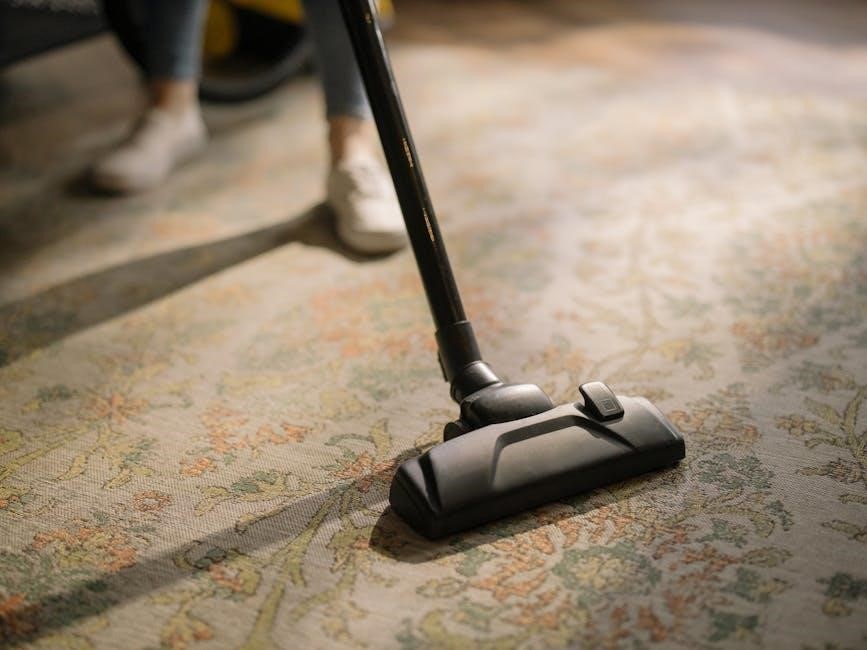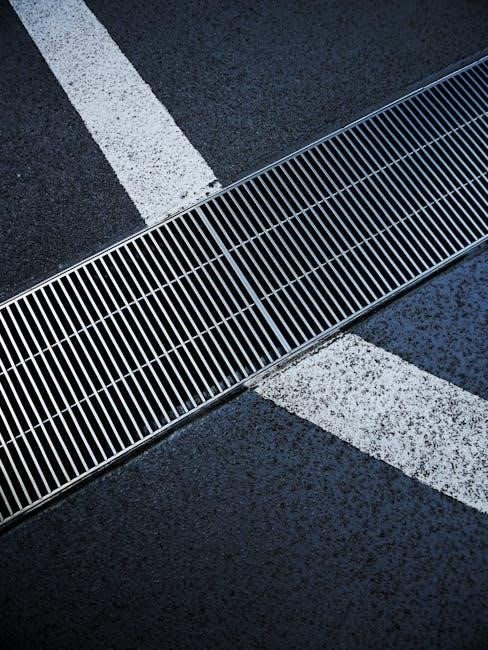Prevention Tips
Regular maintenance is key to a clog-free shower drain. Start by installing a drain strainer to catch hair and debris. Avoid pouring grease or oil, as they solidify and block pipes. Use mesh laundry bags for washing items that shed fibers. Be mindful of shaving in the shower, as hair accumulates quickly. Finally, clean the drain weekly with boiling water or a baking soda and vinegar solution to prevent buildup.
- Install a drain strainer to catch hair and debris.
- Avoid pouring grease or oil down the drain.
- Use mesh laundry bags for shedding fabrics.
- Be mindful of shaving in the shower.
- Clean the drain regularly with natural solutions.
Install a Drain Strainer
Installing a drain strainer is one of the most effective ways to maintain a clog-free shower drain. A strainer acts as a barrier, catching hair, soap residue, and other debris before they enter the pipes. This simple device can significantly reduce the risk of clogs and make cleaning easier. Choose a durable strainer that fits your drain perfectly and is easy to clean. For added convenience, opt for a strainer with a removable and washable design. Regularly emptying the caught debris will prevent buildup and ensure water flows smoothly. This small investment can save you from dealing with messy clogs and costly repairs down the line.
- Prevents hair and debris from entering the drain.
- Reduces the need for frequent deep cleaning.
- Extends the lifespan of your plumbing system.
Avoid Pouring Grease or Oil
Pouring grease or oil down the shower drain is a common mistake that can lead to severe clogs. These substances may flow easily when hot, but they solidify upon cooling, creating stubborn blockages in pipes. Over time, this buildup can narrow the drainage pathway, slowing water flow and eventually causing complete blockages. To prevent this, never dispose of cooking grease, oil, or food scraps through the drain. Instead, let them cool and harden, then discard them in trash bins. This simple practice significantly reduces the risk of clogs and protects your plumbing system from damage. Regularly flushing the drain with boiling water can also help break down any residual grease before it becomes a problem.
- Grease and oil solidify in pipes, causing clogs.
- Dispose of cooled grease in trash bins.
- Flush drains with boiling water to break down residue.
Use Mesh Laundry Bags
Mesh laundry bags are an excellent tool for preventing clogs in your shower drain. When washing items like loose fabrics, lint-producing materials, or anything that sheds fibers, place them in a mesh bag before washing. This simple step catches loose hairs, fibers, and debris, preventing them from going down the drain. After washing, empty the bag and dispose of the collected material in the trash. This practice is especially useful for items like towels, washcloths, and clothing prone to shedding. Regular use of mesh bags reduces the risk of clogs and protects your plumbing system from damage. It’s a cost-effective and easy way to maintain a clog-free shower drain.
- Use mesh bags for washing loose fabrics.
- Prevent fibers and debris from entering the drain.
- Empty the bag after washing and dispose of contents properly.
Be Mindful of Shaving
Shaving in the shower can lead to hair accumulation in the drain, causing clogs over time. To prevent this, consider using a drain strainer or catcher to trap hair before it goes down the drain. After shaving, wipe excess hair off your razor with a tissue or paper towel and dispose of it in the trash. For smaller amounts of hair, rinse the razor over the trash or a designated container. Regular cleaning of the drain after shaving sessions can also help maintain smooth water flow. Additionally, trimming hair before shaving can reduce the amount that ends up in the drain.
- Use a drain strainer or catcher during shaving.
- Dispose of hair in the trash after shaving.
- Trim hair before shaving to reduce waste.

Cleaning Methods
Effective methods include boiling water flushes, baking soda and vinegar solutions, and enzymatic cleaners to break down debris without harsh chemicals, ensuring a smooth drain flow;
- Boiling water flushes clear organic buildup.
- Baking soda and vinegar create a natural cleaning reaction.
- Enzymatic cleaners dissolve hair and soap scum.
Boiling Water Flush
A boiling water flush is a simple yet effective method to clear minor clogs and maintain a clog-free shower drain. Start by pouring boiling water slowly down the drain to avoid cracking the pipes. This helps dissolve and flush out soap scum, grease, and hair buildup. For tougher clogs, let the water sit for a few minutes before rinsing with hot water. Regular use of this method can prevent future blockages and keep your drain flowing smoothly. Always exercise caution when handling boiling water to avoid burns. This eco-friendly approach is cost-effective and gentle on pipes compared to chemical cleaners.
Baking Soda and Vinegar Solution
A baking soda and vinegar solution is a natural and effective way to maintain a clog-free shower drain. Start by pouring 1 cup of baking soda down the drain, followed by 1 cup of distilled white vinegar. The mixture will fizz and bubble, breaking down hair, soap scum, and other debris. Let it sit for 15–20 minutes to allow the solution to work. Afterward, rinse the drain with boiling water to flush out the loosened material. This method is gentle on pipes and environmentally friendly. For best results, repeat this process monthly as part of your maintenance routine. It’s a cost-effective alternative to chemical cleaners and helps prevent future clogs.
- Pour 1 cup of baking soda down the drain.
- Add 1 cup of distilled white vinegar.
- Let the mixture sit for 15–20 minutes.
- Rinse with boiling water to flush debris.
Enzymatic Cleaners
Enzymatic cleaners are a powerful tool for maintaining a clog-free shower drain. These eco-friendly products contain natural enzymes that break down organic matter like hair, soap scum, and grease. Unlike harsh chemicals, enzymatic cleaners are gentle on pipes and safe for septic systems. To use, pour the recommended amount down the drain and let it sit overnight. The enzymes will digest the buildup, leaving your drain flowing smoothly. Regular use helps prevent future clogs and eliminates odors. For best results, apply enzymatic cleaners monthly as part of your maintenance routine. They are an effective and sustainable solution for keeping your shower drain clear and functioning properly.
- Pour the recommended amount down the drain.
- Let it sit overnight to allow enzymes to work.
- Gentle on pipes and safe for septic systems.
- Use monthly for preventive maintenance.

Tools and Products
Essential tools for clog-free shower drain maintenance include drain snakes, plungers, and natural vs. chemical cleaners. These products help remove blockages and prevent future buildup effectively.
- Drain snakes for removing hair and debris.
- Plungers to create suction and clear clogs.
- Natural cleaners like baking soda and vinegar.
- Chemical cleaners for tough blockages.
Drain Snakes
A drain snake is a versatile tool for clearing clogs in shower drains. It consists of a flexible cable that can be inserted into the drain to break up or retrieve hair, soap scum, and debris. Manual drain snakes are cost-effective and easy to use, while electric versions offer more power for tough blockages. To use a drain snake, feed the cable into the drain until resistance is met, then twist and pull to remove the clog. Regular use of a drain snake can prevent buildup and keep the drain flowing smoothly. It’s a must-have tool for maintaining a clog-free shower drain and addressing issues before they escalate.
- Flexible cable design for reaching deep clogs.
- Manual or electric options for varying needs.
- Effective for removing hair and debris.
- Regular use prevents future blockages.
Plungers
Plungers are essential tools for maintaining a clog-free shower drain. They work by creating suction to dislodge blockages caused by hair, soap scum, and debris. To use a plunger effectively, ensure the drain is covered with water to create a seal, then push down firmly and lift repeatedly. This motion helps break up the clog and restore proper drainage. Regular use of a plunger can prevent minor issues from becoming major problems. It’s a simple, cost-effective solution for quick fixes and routine maintenance.
- Creates suction to remove blockages.
- Effective for hair and debris clogs.
- Regular use prevents drainage issues.
- Affordable and easy to use.
Natural vs Chemical Cleaners
When maintaining a clog-free shower drain, choosing between natural and chemical cleaners depends on personal preference and the severity of the clog. Natural cleaners, such as baking soda and vinegar, are eco-friendly and gentle on pipes. They work by creating a chemical reaction that breaks down buildup without harsh chemicals. On the other hand, chemical cleaners are stronger and faster-acting, making them effective for tough clogs. However, they can damage pipes over time and are less environmentally friendly. For routine maintenance, natural methods are recommended, while chemical cleaners are best reserved for severe blockages.
- Natural cleaners: gentle and eco-friendly.
- Chemical cleaners: strong but potentially harmful.
- Use natural methods for routine care.
- Reserve chemicals for tough clogs.

Maintenance Schedule
Flush drains weekly with boiling water to remove debris. Use baking soda and vinegar for a natural, gentle clean.
- Boil water and pour down the drain.
- Use baking soda and vinegar solution weekly.
Perform a monthly deep clean with enzymatic cleaners or a drain snake to remove built-up hair and residue for optimal flow.
- Apply enzymatic cleaners for deep cleaning.
- Use a drain snake to remove tough blockages.
Weekly Cleaning Routine
Adopting a weekly cleaning routine is essential for maintaining a clog-free shower drain. Start by pouring boiling water down the drain to break down any organic buildup. Follow this by using a baking soda and vinegar solution: pour 1 cup of baking soda into the drain, then add 1 cup of white vinegar. Allow the mixture to fizz and sit for 15-20 minutes before rinsing with hot water. Additionally, take a few minutes to inspect and clean the drain strainer or hair catcher to remove any accumulated debris. For extra maintenance, flush the drain with warm soapy water to keep it flowing smoothly. Consistency is key to preventing clogs and ensuring your shower drain remains efficient and odor-free.
- Pour boiling water down the drain.
- Use baking soda and vinegar solution.
- Clean the drain strainer regularly.
- Flush with warm soapy water for added maintenance.
Monthly Deep Clean
A monthly deep clean is crucial for maintaining a clog-free shower drain. Start by pouring 1 cup of baking soda down the drain, followed by 1 cup of white vinegar. Allow the mixture to fizz and break down buildup for 30 minutes. Rinse thoroughly with boiling water to flush out debris. For tougher clogs, use an enzymatic cleaner to dissolve organic matter like hair and soap scum. Let it sit overnight before rinsing with warm water. Additionally, remove and soak the drain strainer in a solution of hot water and dish soap to eliminate any accumulated residue. Regular deep cleaning prevents severe blockages and keeps your drain flowing smoothly.
- Pour baking soda and vinegar down the drain.
- Rinse with boiling water after fizzing.
- Use enzymatic cleaners for tough buildup.
- Clean the drain strainer in soapy water.

Common Mistakes
Avoid flushing paper products, as they do not break down and can cause clogs. Steer clear of oily substances, which solidify and block drains over time.
- Avoiding paper products in the drain.
- Steering clear of oily substances.
- Avoid flushing toilet paper, paper towels, or wipes.
- Dispose of paper waste in trash bins.
- Use a drain strainer to catch debris.
- Avoid pouring grease or oil-based products down the drain.
- Dispose of oily substances in trash containers.
- Use natural cleaners to break down residual oils.
Avoiding Paper Products
Avoid flushing paper products like toilet paper, paper towels, or wipes down the shower drain, as they do not break down easily and can cause clogs. These items, even if used in small quantities, can accumulate over time and create stubborn blockages. Unlike organic matter, paper products do not dissolve quickly, leading to a buildup that narrows the drainpipe. This is especially true for wet wipes, which are often marketed as flushable but do not decompose like toilet paper. To prevent such issues, ensure all paper waste is disposed of in trash bins. Regularly cleaning the drain and using a strainer can also help prevent paper-related clogs. Remember, only water, soap, and shampoo should go down the shower drain to maintain a clog-free system.
Steer Clear of Oily Substances
Oily substances, such as grease, lotion, and oil-based skincare products, should never be poured down the shower drain; These substances can cling to the walls of pipes, creating a sticky residue that traps hair and other debris, leading to clogs. Over time, this buildup can cause slow drainage or even complete blockages. Instead of rinsing these substances down the drain, dispose of them in appropriate containers or trash bins. Regularly cleaning the drain with boiling water or natural solutions can help break down any residual oils. Being mindful of what goes down the drain is crucial for maintaining a clog-free system and preventing costly plumbing repairs.